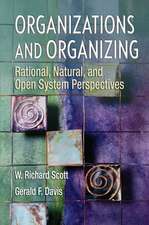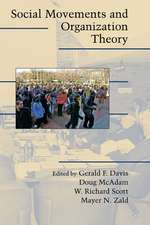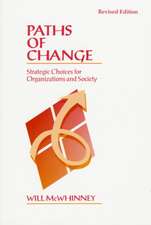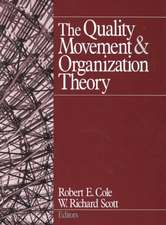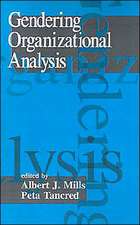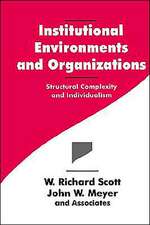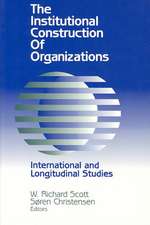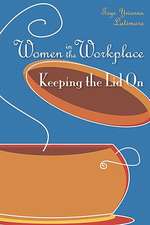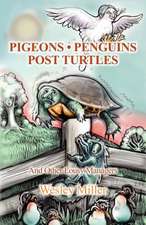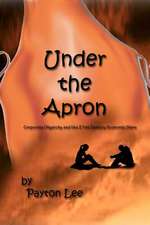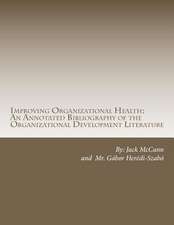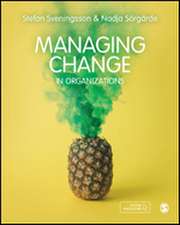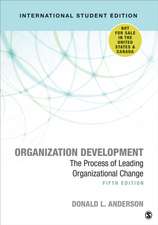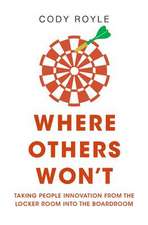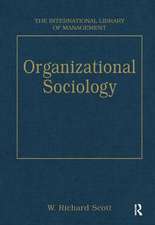Institutions and Organizations: Ideas, Interests, and Identities
Autor W. Richard Scotten Limba Engleză Paperback – 9 sep 2013
- Elaborates on the three pillars of institutions as part of a larger framework and sheds light on the interplay between institutions and social systems
Includes a detailed discussion between three differing explanations and approaches of institutionalization—economic, sociological, and neo-institutional scholars in organizational studies
- Examines how symbols, relations, routines, artifacts, and other carriers transmit institutional arrangements across time and space
- Devotes a chapter to the theoretical and practical significance of organization fields
Emphasizes the best and most recent theoretical and empirical contributions in each chapter
Preț: 536.83 lei
Preț vechi: 725.45 lei
-26% Nou
Puncte Express: 805
Preț estimativ în valută:
102.74€ • 106.86$ • 84.81£
102.74€ • 106.86$ • 84.81£
Carte disponibilă
Livrare economică 24 martie-07 aprilie
Livrare express 08-14 martie pentru 29.33 lei
Preluare comenzi: 021 569.72.76
Specificații
ISBN-13: 9781452242224
ISBN-10: 1452242224
Pagini: 360
Ilustrații: illustrations
Dimensiuni: 152 x 229 x 16 mm
Greutate: 0.48 kg
Ediția:Fourth Edition
Editura: SAGE Publications
Colecția Sage Publications, Inc
Locul publicării:Thousand Oaks, United States
ISBN-10: 1452242224
Pagini: 360
Ilustrații: illustrations
Dimensiuni: 152 x 229 x 16 mm
Greutate: 0.48 kg
Ediția:Fourth Edition
Editura: SAGE Publications
Colecția Sage Publications, Inc
Locul publicării:Thousand Oaks, United States
Recenzii
“This book offers a comprehensive synthesis of previously divergent theoretical perspectives in the study of institutions and organizations. Concise, clear, and insightful, the book is the best short introduction to institutional theory in general and the contributions made particularly by sociologists. This book also contributes to the construction of general tools for studying institutions and organizations by providing comprehensive analytic concepts and frameworks. . . . It will be one essential tool for my research and also my coursework.”
“Very well organized and logical flow of the chapters. . . . The author is very knowledgeable about the literature and does an effective job of integrating it into a framework for analysis. . . . I think it is one of the most comprehensive books on institutional theory.”
“This text is an excellent example of how a theoretical framework can be used to bring order to a complex field of study. The framework is supported with theory and can be used by students and practitioners to better understand their organizations.”
“. . . [I]t is the key overview text in the institutional field.”
“. . . [G]ood literature on institutional theory. . . . Keep up with the good work.”
The book offers readers a thought-provoking discussion of the relationship between institutions and organizations and how this impacts studies of the emergence of agency-driven strategies based on creative ideas, changing interests and multilayered identities. Perhaps one of the greatest contributions of the book, however, is that it pays homage to a holistic approach in international business studies, thus identifying the way forward for the next generation of theoretical enquiries in this area. This reviewer can recommend this book in the strongest terms possible. It provides a highly rewarding and provocative journey into new roads within international business studies as well as within social science in general.
“Very well organized and logical flow of the chapters. . . . The author is very knowledgeable about the literature and does an effective job of integrating it into a framework for analysis. . . . I think it is one of the most comprehensive books on institutional theory.”
“This text is an excellent example of how a theoretical framework can be used to bring order to a complex field of study. The framework is supported with theory and can be used by students and practitioners to better understand their organizations.”
“. . . [I]t is the key overview text in the institutional field.”
“. . . [G]ood literature on institutional theory. . . . Keep up with the good work.”
The book offers readers a thought-provoking discussion of the relationship between institutions and organizations and how this impacts studies of the emergence of agency-driven strategies based on creative ideas, changing interests and multilayered identities. Perhaps one of the greatest contributions of the book, however, is that it pays homage to a holistic approach in international business studies, thus identifying the way forward for the next generation of theoretical enquiries in this area. This reviewer can recommend this book in the strongest terms possible. It provides a highly rewarding and provocative journey into new roads within international business studies as well as within social science in general.
Cuprins
Preface
Introduction
1. Early Institutionalists
2. Institutional Theory Meets Organizations
3. Crafting an Analytic Framework I: Three Pillars of Institutions
4. Crafting an Analytic Framework II: Logics, Agency, Carriers, and Level
5. Institutional Construction
6. Institutionalization
7. Institutional Processes and Organizations
8. Institutional Processes and Organization Fields
9. An Overview, an Observation, a Caution, and a Sermon
References
Index
About the Author
Introduction
1. Early Institutionalists
2. Institutional Theory Meets Organizations
3. Crafting an Analytic Framework I: Three Pillars of Institutions
4. Crafting an Analytic Framework II: Logics, Agency, Carriers, and Level
5. Institutional Construction
6. Institutionalization
7. Institutional Processes and Organizations
8. Institutional Processes and Organization Fields
9. An Overview, an Observation, a Caution, and a Sermon
References
Index
About the Author
Notă biografică
Descriere
By presenting the differences as well as the underlying commonalities of institutional theories, this book presents a cohesive view of the many flavours and colours of institutionalism. It evaluates and clarifies developments in both theory and research while identifying future research directions.

